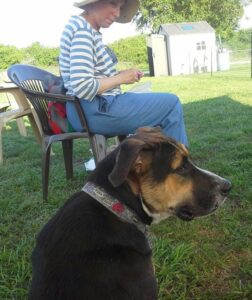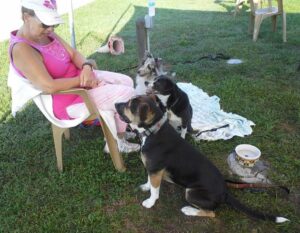Barks Blog
Remedial Socialization

I’m embarking on a new adventure in remedial socialization. I have a foster dog who is wonderful with other dogs, but totally avoids humans whenever possible. Sally is playful and sweet once you get to know her, but her first impression leaves a lot to be desired. Since she is reluctant to approach new people, Sally, and dogs like her, linger in shelters due to their inability to connect with potential adopters.
I have coached quite a few clients through similar issues and have helped two of my other dogs overcome their social inadequacies. Each dog is different, but the methods I use are similar for all my fearful, shy and under socialized canine friends.
I think the first thing you need to do is let go of all your expectations. Someone recently commented that I understand Sally. It isn’t that I understand her. I don’t really know what she is thinking. But, I do understand any overture toward Sally will be met with rejection. I am content to wait and allow her time to realize she is safe and has a choice. Since I don’t place Sally under any social pressure, she can make her own choice to interact or not. This freedom of choice and lack of expectations give her time to process each situation.
Another strategy I recommend for dogs undergoing remedial socialization is to keep the sessions short. Emotionally, working on social skills is exhausting. I notice many of these dogs sleep for quite some time after our sessions. It’s important to give the dog frequent breaks to prevent trigger stacking and to allow him a chance to assimilate information.

Having a social dog as a role model can really help under socialized dogs. I find it interesting my rehabilitated dogs are helping Sally with her social skills. Since Jesse and Rio have learned to enjoy human interactions, Sally is more interested in them as well. When people are patient, Sally will approach, still with caution, but she is feeling more relaxed every day.
This lack of socialization is insidious and largely unrecognized. It adversely affects many dogs found in private homes as well as shelters and rescues. Shy, fearful and under-socialized dogs linger in adoption centers due to their inability to connect with potential adopters. This lack of socialization is a type of neglect that challenges a dog and his owners for their whole lives together.
To learn more about dog training the force-free way, register for the Pet Professional Guild’s inaugural educational Summit in Tampa, Florida on November 11-13, 2015.
